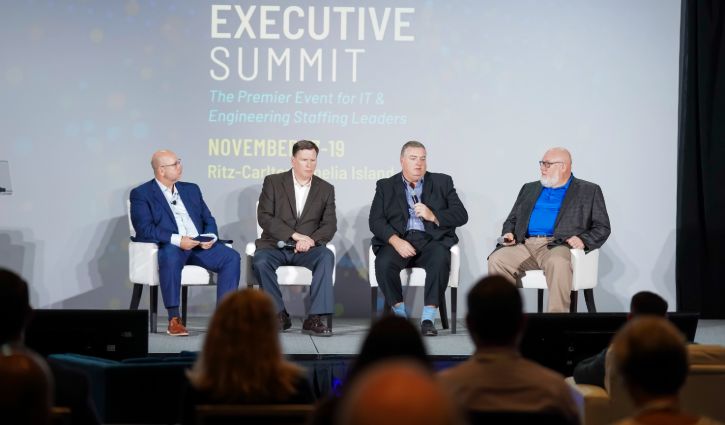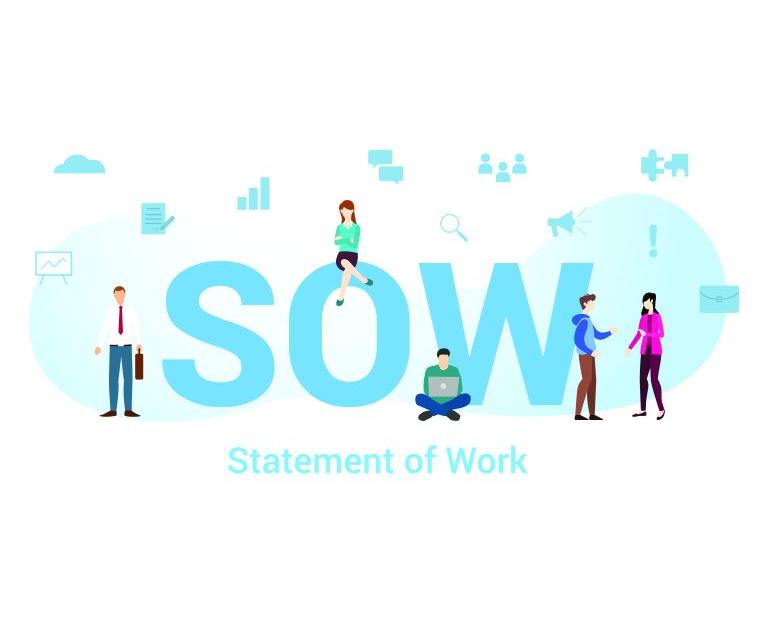How has the impact of the pandemic and disruptive technologies changed their talent acquisition needs?
Beau Mesereau, CIO of the international law firm Fish and Richardson P.C., was one of the fortunate ones who didn’t have to let go any member of his team at the start of the pandemic. However, things changed as the company started to implement return-to-office plans.
“I have seen more people leave in the last month than I have in the last 5 years,” Beau said during a panel discussion at the TechServe Alliance Executive Summit in November. Historically, he has always hired for his team himself, without any assistance from staffing firms, or HR for that matter. But this time around, it was a different story.
“I have a supervisor position open, and we have been struggling to hire someone,” Beau shared with an audience of 300+ owners and senior executives of IT and engineering staffing and technology companies. “It was pretty eye-opening when we advertised for the supervisor position, and we had only three people apply!”
So, Beau reached out for help to that one staffing firm that had done a good job of staying in touch all these years, genuinely trying to build a relationship rather than pushing him to engage their services.
Know Thy Customers
Indeed, understanding customers’ needs and the importance of partnership rather than a transactional mindset was a key message that echoed loud and clear during the TechServe Alliance Executive Summit panel discussion entitled, The CIO Mindset in 2021 and Beyond. Beau was in the panel with Blake Holman, CIO of St. David’s Foundation, and Tom McCurely, CIO of Chef’s Warehouse, with Scott Aicher, president of Belcan Workforce Solutions, as the moderator.
And what’s the best avenue for staffing firms to cultivate such partnerships with clients? It’s not emails or even LinkedIn InMail’s, and certainly not cold calls. The consensus from the panelists was that networking during conferences is the optimal way for staffing firms to connect with them. During these events, IT executives are more relaxed and open to having a conversation with staffing and technology solution providers.
“Expend the effort to meet me on my turf,” said Blake of St. David’s Foundation. “Maybe at a SIM (Society for Information Management) meeting or some kind of a philanthropy event. Do a little bit of research and try and find out what I am interested in. In a lower stress situation, we can start with a conversation, start developing a relationship and building that trust.”
Show Me the Value!
The panel then discussed in detail how they expect to engage with staffing firms to fulfill their hiring needs. For example, when Tom of Chef’s Warehouse is hiring contractors, he is less focused on the soft skills and more focused on specific technical skill sets needed to complete a project. When hiring for fulltime positions, he expects staffing firms to not go look for that one candidate but to share at least two or three good resumes. He sees value in a staffing firm when they save him time by scrubbing and vetting the resumes based on his needs.
“You can tell when someone is struggling when in two-three weeks I get just one resume. Why is it so difficult?” Tom said. “It’s really about how much that upfront work is done to clarify the job description. Really screen the candidates so I or my direct reports aren’t spending the time to screen them.”
Beau reminded the audience to also let the client know how much effort has gone into filtering the resumes. “When you are sourcing a candidate, do all that scrubbing, but let me know that you have screened out 50 other horrible candidates. Give those stats, let me learn the value that you are providing for me.”
Additionally, it is important to note that good vetting happens when staffing firms understand each client’s unique requirements. “Technical skills are the last things that I look at,” Blake said. “I look for the EQ skills first that I think are much harder to train for than the technical skills. Understand that landscape so you have a much more informed starting point for attacking that talent pool and weeding out the crappy ones.”
2022 Hiring Needs and Skill Sets
The panelists also shared some technical skill sets that are hot in demand, such as security, data integration, AI and ML, and process automation. However, there is an additional twist to these requirements. For example, companies today are not only looking for just a SQL server DBA or a cyber security administrator. Companies also want candidates to have experience in hosting SQL in the cloud. In addition to the technical expertise, candidates also should be able to understand and solve business problems.
Finally, the panelists talked about their efforts to create a pool of talent to address the scarcity of IT professionals. These efforts ranged from hosting events in partnership with training firms, bringing in more entry-level people and growing them within the organization, and working with community colleges to set up internship programs to provide some real-life work experience so these interns can eventually become part of the candidate pipeline.
The pandemic, the ensuing “Great Resignation,” and the dearth of qualified IT professionals has certainly injected a sense of urgency in organizations to make quicker hiring decisions, increase wages, and to be more mindful of their workforce’s need for a flexible and inclusive environment. It has also reinforced what organizations want from their staffing partners: Efficient and expeditious identification and acquisition of talent.













